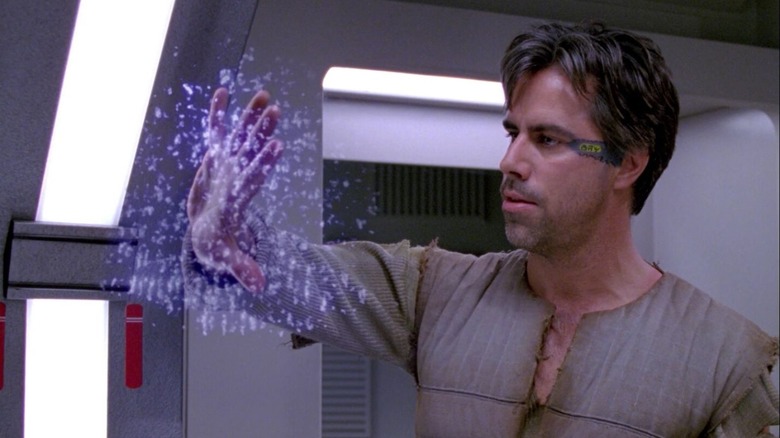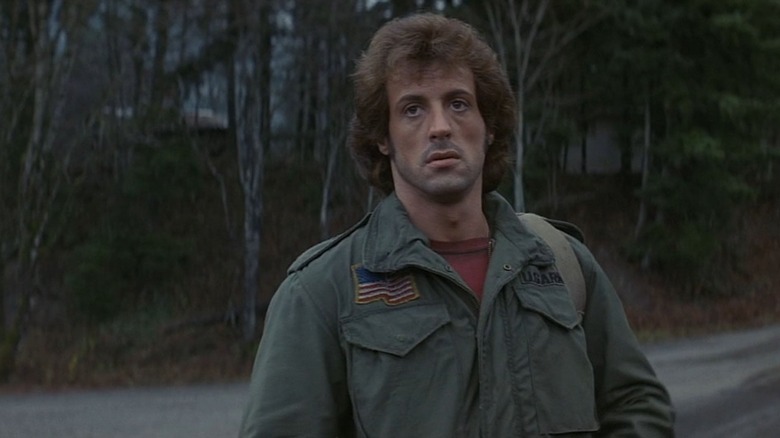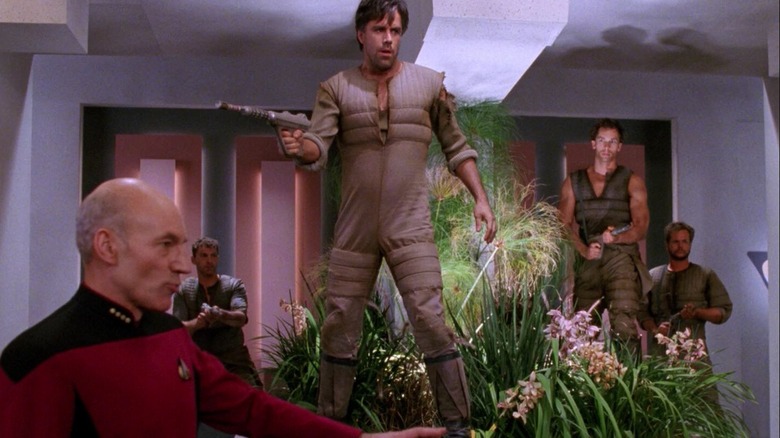One Star Trek Episode Retold Rambo's First Blood On The Enterprise
In the 1990 "Star Trek: The Next Generation" episode "The Hunted," the U.S.S. Enterprise has arrived at a world called Angosia III to give the planet a final once-over before they are accepted into the Federation. Everything seems pleasant and copacetic, and the planet's Prime Minister Nayrok (James Cromwell) seems enlightened. As one might predict, something afoul is afoot. Nayrok tells Captain Picard (Patrick Stewart) that a dangerous criminal has escaped from an Angosian prison on one of their moons. The Enterprise spends a long while tracking this wily prisoner who seems incredibly adept at avoiding detection. Eventually, they do apprehend him and put him in the Enterprise's brig.
This is Roga Danar (Jeff McCarthy), and he did indeed escape from prison, and admits that he is perfectly willing to commit acts of violence to protect himself. The crew of the Enterprise begins looking into the past and character of this mysterious Danar, and find some facts they didn't expect. Counselor Troi (Marina Sirtis), for instance, notes that Danar feels no aggression or anger in prison. He explains that he is a former soldier, having been genetically enhanced to respond with guile and violence when confronted on the battlefield. Other soliders like him are also in prison. The Enterprise also finds that Danar actually has no criminal record, leading to a mystery: why would the Angosians lock him up if he had committed no crime?
It seems that the Angosians, in times of peace, were merely imprisoning their war veterans as a matter of course. Unable to unwrite their soldierly genetic conditioning, the government merely brushed them aside, ignoring their needs and denying their existence.
This is, of course, the plight suffered by John Rambo (Sylvester Stallone) in Ted Kotcheff's 1982 film "First Blood."
First Blood
It should be remembered that Kotcheff's "First Blood" is an incredibly somber film. In the sequels to "First Blood," John Rambo would be mutated into a superhuman, ultra-American badass killing machine, so one might easily lose sight of the fact that Rambo started out as a sad, tragic figure. At the beginning of "First Blood," Rambo is living on the road, seemingly homeless, only in town to visit a fellow buddy from his old army platoon in Vietnam. Everything is grey and quiet.
Rambo's friend, he finds, has died. Another one gone, Rambo seems to think. America has discarded its Vietnam veterans, likely embarrassed and ashamed over the deceit and atrocities surrounding the Vietnam War. American disdain is personified in the form of a local sheriff played by Brian Dennehy. The sheriff berates Rambo and insists he leave town. The cops continue to chide and pester Rambo, driving him into the woods. There, he "activates," shifting back into his wartime mentality. Cops drew first blood. Now Rambo, largely against his will, becomes a kill monster. He kills with utter capability. It's horrible.
What Rambo does might be seen as badass on the surface — and Richard Crenna arrives in the film to explain just how dangerous John Rambo is — but the film is not a story of capability or heroism. In war, "First Blood" argues, there is no heroism. War demands we mindwipe young men to become murderers, and then do nothing when the time comes for them to re-enter everyday life.
John Rambo was discarded. Roga Danar was literally imprisoned. In both cases, their respective home countries have done everything to erase their existence. In both cases, the killing machine's violent tendencies return.
But, please, no second blood
In Abraham Maslow's words, "If the only tool you have is a hammer, you tend to see every problem as a nail." Both John Rambo and Roga Danar seem to have little recourse but to react to dangerous situations violently. They have both been specially conditioned by their respective militaries to shoot first and never ask questions.
In the case of Danar, his government is actively complicit. In "Rambo" — and in the United States in general — the government merely refuses to give veterans the care they need, but on "Star Trek," the culprit is a little more clear cut. Danar flees the Enterprise, gathers several compatriots, acquires weapons, and aims to attack the capital, demanding that Nayrok do something, anything, to help. Picard is present for the attack, and explains that if Nayrok fights back, Danar and his friends will "activate" and more violence will occur. Danar doesn't want to kill.
Nayrok begs that the Federation interfere to stop the attack, but Picard merely responds by saying that he has witnessed nothing but human rights violations on Angosia III. Picard tells Nayrok that he should take better care of his planet's veterans. This, of course, is the theme of the episode. It is also the message behind "First Blood."
As mentioned above, the sequels to "First Blood" didn't learn the lesson. Rambo was quickly transformed (notably during the Reagan era) into an all-American destructive superhero. "Star Trek," meanwhile, ultimately falls on the side of Danar, understanding that he is not a criminal, but an exploited victim of an abusive government. Some day, Picard notes, Angosia III may be ready for induction into the Federation. But not until it can treat its citizens well.


